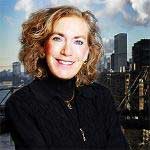Cell biologist Elaine Fuchs is known for revolutionizing the study of skin and for her support of women in science.
Children, Elaine Fuchs says, have a natural fascination with science. She remembers that she did.
"I think like many of the children in our world, I got interested in science just from having a butterfly net and from having a few strainers and some boots and going down to the streams and creeks and being out in the fields," says Fuchs.
Her childhood fascination with science grew with her. She moved from butterflies to biochemistry, and her research over the past three decades has revolutionized the study of skin and skin diseases.

Working at the leading edge of research on cellular biology and genetic skin disorders, Fuchs was the first to precisely describe keratins — the principal structural proteins of skin cells — and identify diseases caused by mutations in the keratin gene. In her lab at the Rockefeller University in New York, she is currently studying how skin forms from precursor stem cells, looking for clues that could help researchers understand how defective stem cells can cause cancers and other disorders.
Fuchs is proud that her research and teaching have blazed trails.
"I'd have to say that equally on both sides of the coin, my successes with regards to my science are the discovery of the genetic basis of a number of different human skin diseases, using very unconventional approaches, which are now [the accepted] approaches in medical textbooks, but at the time, they were very unconventional," she says. "On the other side of the coin, I would say I'm very proud of the many different students that I have trained who are now university professors themselves."
In addition to her research and teaching, Fuchs serves as president of the American Society for Cell Biology, and is president-elect of the International Society for Stem Cell Research.
In recognition of her contributions, Fuchs has received numerous awards. Last year, President Barack Obama presented her with the National Medal of Science. This year, she was named one of the laureates for the L'Oreal-UNESCO Awards for Women in Science.
"It's certainly an honor. It's one of the most prestigious awards not only just for women but really one of the most prestigious awards in science around the world," she says. "It's also a wonderful concept to reward a woman from each of the five major regional areas in which science is being conducted around the world, in a celebration of not only women in science, but also the importance of science in a world community."
When Elaine Fuchs began her undergraduate studies, there were very few women in the sciences, and their work was rarely encouraged or recognized. Fuchs credits the strong female role models in her life for inspiring and supporting her scientific career.
"My aunt was a biologist. She was a very strong feminist, very much integral in the women's organizations that emerged in the 1960s and 1970s in the United States," she says.
"I'd have to say my mother was one of the most instrumental people in my life," says Fuchs. "She was a housewife but she took pride in everything that she did. She encouraged my sister and I in all different ways. My mom always said, 'You're a good cook, you'll make a fine scientist,' when I told her that I like science. So I think those kinds of little things maybe are more important that any of the bigger things."
Now, as a role model herself, Fuchs is reaching out to girls and young women, encouraging them to pursue careers in science.
"This past year, I was a visiting scholar for the Phi Beta Kappa Society and went to small liberal arts colleges in the United States, and not only gave public lectures about science, but also research lectures, and then also spoke with women about the importance of bringing their intellectual force, which is formidable, to the scientific arena in the future."
When she talks to young women, Fuchs says she tells them that many opportunities await them in the science fields. She also dispels misconceptions about being a scientist.
"The notion that a scientist is some weird person who sits in the corner working at their laboratory bench, never talking to anybody, couldn't be further from the truth," she says. "Science is such an interactive and collaborative area. It's an incredibly social environment that really constitutes the breakthroughs."
Professor and researcher Elaine Fuchs says it's incredibly rewarding to work in scientific research. She finds it exciting to make discoveries and find new ways to solve scientific challenges. And she adds it is gratifying to be able to make a difference.
strainer: a kitchen utensil(= a tool) with a lot of small holes in it, used for separating solids from liquids 濾器;濾盆;濾網(wǎng)
keratin: a protein that forms hair, feathers, horns, hooves, etc.(發(fā)、羽、角、蹄等的)角蛋白
precursor: a person or a thing that comes before somebody/something similar and that leads to or influences its development 先驅(qū);先鋒;前身
blaze a trail: to be the first to do or to discover something that others follow 作開路先鋒;領先
Margaret Mead: a public face of Anthropology
Jane Goodall: still hard at work for the chimps
Looking for new uses for spices in the medical lab
(來源:VOA 編輯:陳丹妮)
